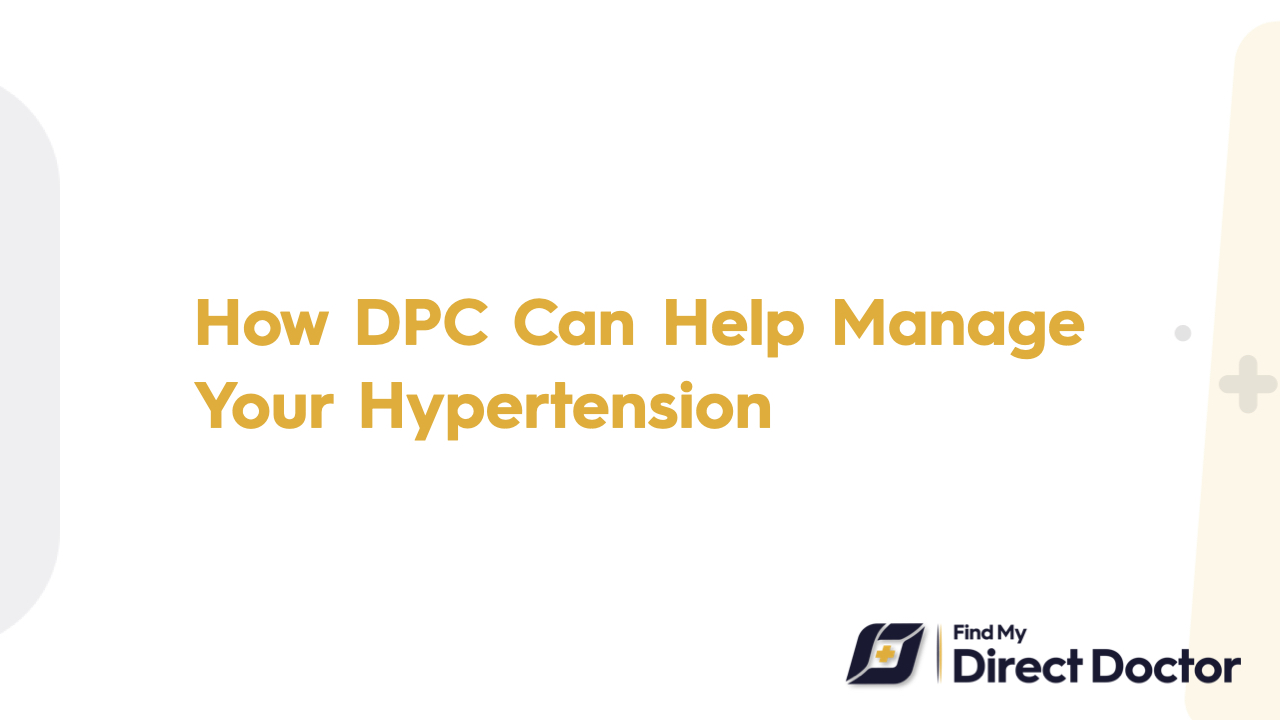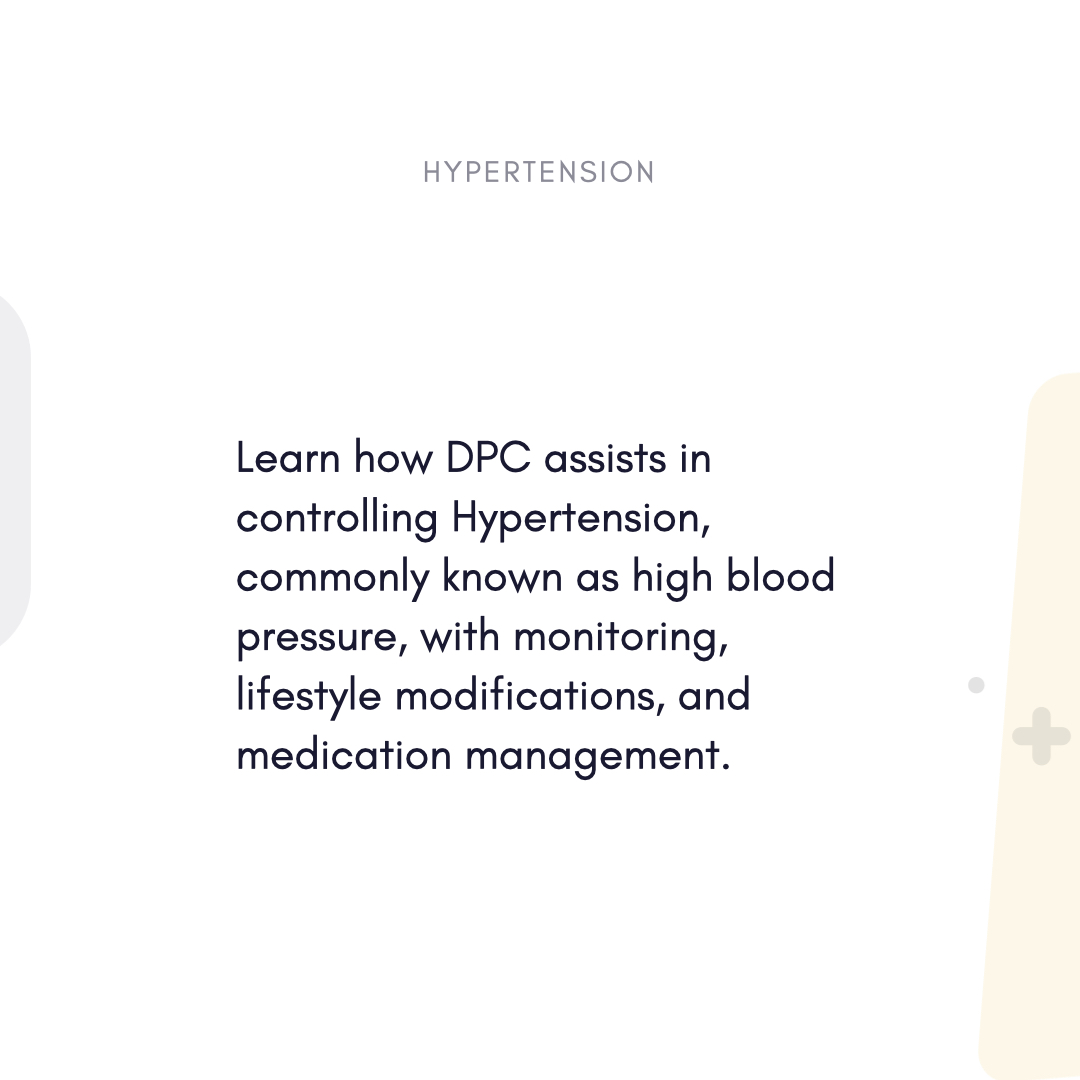Hypertension and Direct Primary Care (DPC): Your Path to Personalized, Proactive Control
If you have been advised your blood pressure is too high, you are not alone—nearly half of U.S. adults have hypertension. Ignored, this "silent killer" compromises kidneys, arteries, and the heart; yet, conventional medicine sometimes treats management as hurried 10-minute visits with generic prescriptions. Offering reasonably priced, patient-centered treatment that addresses the underlying causes of high blood pressure and empowers long-term heart health, Direct Primary Care (DPC) turns the script around. Let's look at how DPC helps you to regain control.

Understanding Hypertension
When blood pressure regularly exceeds 130/80 mmHg, one develops hypertension. Often asymptomatic, it silently increases risks for:
- Strokes or heart attacks.
- Disease of the kidneys.
- Vision fading.
- Cognitive decrease.
Among the challenges are inconsistent treatment, undetectable triggers (such as stress or sleep apnea), and poor medication adherence. Prevention of permanent damage depends mostly on early, consistent management.
DPC Transforms Hypertension Management
Under the membership approach known as Direct Primary Care (DPC), patients pay a monthly fee—usually USD 50–USD 150—for unlimited access to their doctor. This translates for patients with hypertension into no co-pays, no 15-minute time restrictions, and treatment catered to your biology and way of life.
Customized Approach Based on Experience
Emphasizing precision medicine and team-based strategies to maximize results, DPC doctors follow American College of Cardiology (ACC) guidelines. These:
- Look at root causes: hormonal imbalances, sleep apnea, salt sensitivity, or genetic tendencies.
- Create customised plans, aggregating:
- Customized DASH diet plans, exercise regimens, and stress-reducing techniques are among lifestyle strategies.
- Prescription writing for reasonably priced generics (such as lisinopril, amlodipine) and dose changes depending on home monitoring.
- Focus on comorbidity: Treating diabetes, obesity, or kidney disease aggravating hypertension.
- Coordinate treatment by working with cardiologists, pharmacists, and dietitians for all-around support.
Cost-Effective, Transparent Treatment
DPC clinics help to lower expenses by:
- Medications sold wholesale: Generic BP drugs as low as USD 4 a month.
- Discounted labs at cost include hormone tests, lipid panels, and kidney function tests.
- By means of proactive monitoring, avoid ER visits for hypertensive crises.
Ongoing Help for Long-Term Success
Having 24/7 access to your doctor allows you to:
- Rapidly change medications should readings spike.
- Track development using shared blood pressure logs or apps.
- Use mental health tools to address a major BP driver—stress.
Individualized Control of Hypertension in DPC
One size does not fit all when it comes to hypertension. DPC creates exact attention to detail:
- Early intervention: Frequent visits spot trends before organ damage starts.
- Tech integration: Suggesting validated real-time home blood pressure monitors.
- Teaching self-management techniques—such as diet tracking, stress journals—helps to increase adherence by means of patient empowerment.
Real-Life Success Stories
- Case 1: Maria, 52, battled with 150/95 blood pressure readings even on medication. Her DPC physician came upon undiagnosed sleep apnea. Her blood pressure dropped to 125/82 in four months on a low-sodium meal plan, magnesium supplements, and a CPAP machine.
- Case 2: James, 60, skipped scheduled visits because of financial concerns. Affordable labs at his DPC clinic revealed early kidney strain. His doctor changed his prescriptions, included a diuretic, and linked him with a dietitian. James' kidney function got better and his blood pressure steadied.
Frequently Asked Questions: DPC and Hypertension
- Q: Is a cure for hypertension possible?
A: Although often lifetime, many find control with drugs and lifestyle modifications. DPC guides you in striking the proper mix.
- Q: For chronic conditions, is DPC worth the expense?
A: Sure. Most patients save by cutting out ER visits, inflated drug costs, and co-pays. Generally speaking, DPC membership is less expensive than a gym membership.
- Q: What should I do if I need a cardiologist?
A: Your DPC doctor arranges referrals and usually works out echocardiogram or stress test cash-pay rates.
Why DPC Is a Hypertension Win for Patients
DPC delivers according to ACC rules:
- Team-based care: Dietitians, mental health experts, and specialists collaborate.
- Precision focus: Genetic and lifestyle insights customize treatments to your biology.
- Transparency on cost: Medication and lab expenses cut help adherence.
- Prevention-oriented attitude: Lowering stroke risk by means of regular monitoring.
Get Control of Your Blood Pressure Right Now
Hypertension does not have to steal your life. Direct Primary Care provides peace of mind and 24-hour access for quick fixes that change management.
- Customized strategies addressing not only numbers but also root causes.
- Financial clarity will help to lower stress and increase consistency.






